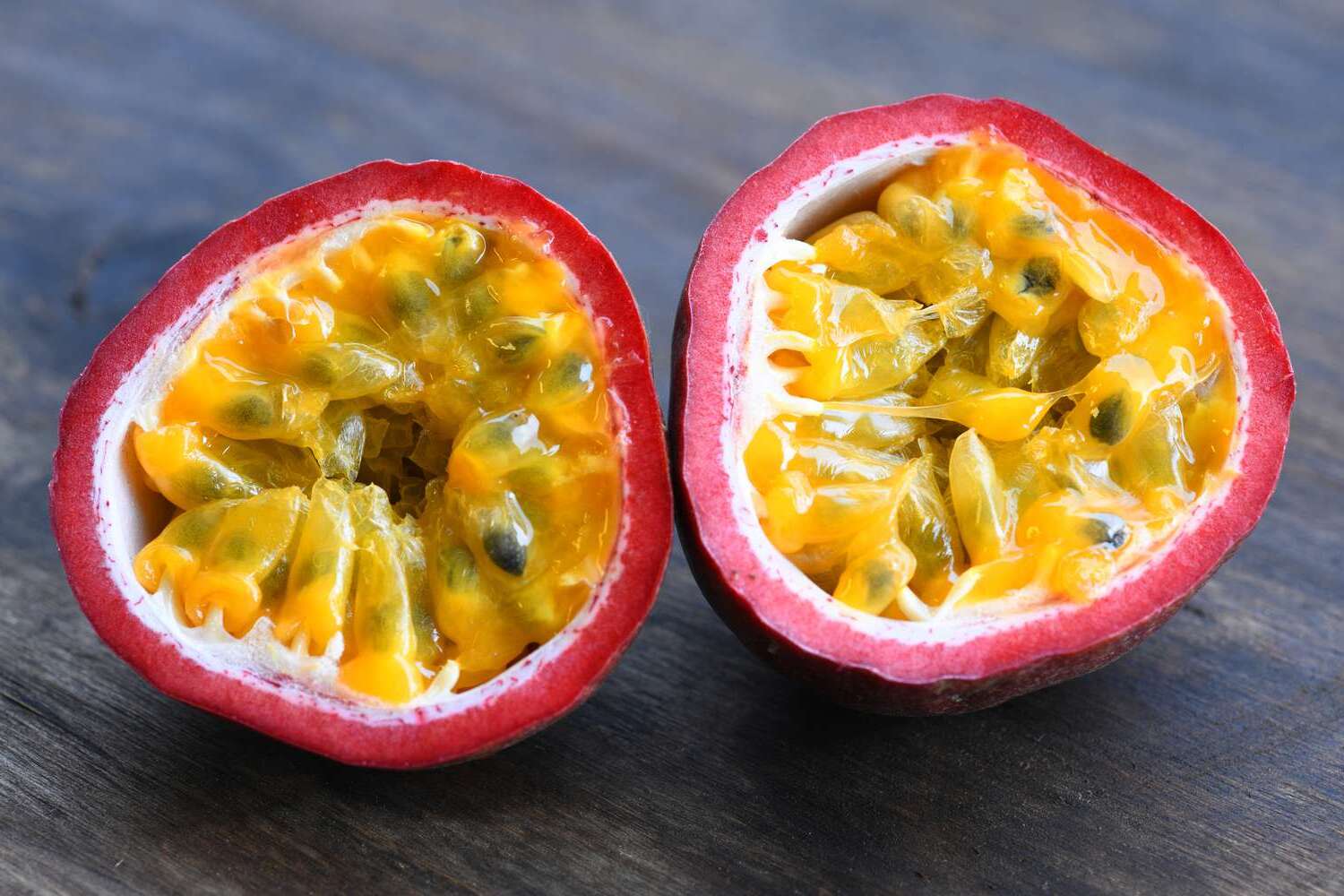
Passionfruit, often called the "fruit of the gods," is a tropical delight that packs a punch of flavor and nutrition. But what makes passionfruit so special? This small, round fruit with a tough outer rind and juicy, seed-filled interior is not just tasty but also loaded with health benefits. From boosting your immune system to improving digestion, passionfruit is a powerhouse of vitamins and antioxidants. Whether you enjoy it fresh, in a smoothie, or as a topping for desserts, this exotic fruit adds a unique twist to any dish. Ready to learn more? Let's dive into 25 fascinating facts about this incredible fruit!
Key Takeaways:
- Passionfruit is a tropical fruit packed with vitamin C, fiber, and antioxidants. It has a unique flavor and can be used in juices, desserts, and even cocktails. It's also easy to grow and offers many health benefits!
- Passionfruit is not only delicious but also good for you! It boosts immunity, improves digestion, and supports heart and skin health. Plus, it comes in different colors and has a wrinkled skin when ripe.
What is Passionfruit?
Passionfruit, also known as Passiflora edulis, is a tropical fruit with a unique flavor and numerous health benefits. Its vibrant color and distinct taste make it a favorite in many dishes and beverages. Let's dive into some fascinating facts about this exotic fruit.
Nutritional Benefits of Passionfruit
Passionfruit is not only delicious but also packed with nutrients. Here are some key nutritional benefits:
- Rich in Vitamin C: Passionfruit contains high levels of vitamin C, which boosts the immune system and helps fight off infections.
- High in Fiber: The fruit is an excellent source of dietary fiber, aiding in digestion and preventing constipation.
- Low in Calories: Despite its sweet taste, passionfruit is low in calories, making it a great option for those watching their weight.
- Contains Antioxidants: Passionfruit is loaded with antioxidants that protect the body from free radicals and reduce inflammation.
- Good Source of Vitamin A: This fruit provides a significant amount of vitamin A, which is essential for eye health and skin maintenance.
Unique Characteristics of Passionfruit
Passionfruit stands out due to its unique characteristics. Here are some interesting traits:
- Distinctive Flavor: The fruit has a sweet-tart flavor that is both refreshing and exotic.
- Aromatic Scent: Passionfruit emits a strong, pleasant aroma that enhances its appeal.
- Edible Seeds: The seeds inside the fruit are crunchy and edible, adding texture to dishes.
- Variety of Colors: Passionfruit can be found in different colors, including purple, yellow, and red.
- Wrinkled Skin: When ripe, the skin of the fruit becomes wrinkled, indicating it's ready to eat.
Culinary Uses of Passionfruit
Passionfruit is versatile and can be used in various culinary applications. Here are some popular uses:
- Juices and Smoothies: The fruit's juice is often used in beverages for its refreshing taste.
- Desserts: Passionfruit is a common ingredient in desserts like cakes, tarts, and ice creams.
- Salads: Adding passionfruit to salads gives them a tropical twist.
- Sauces and Dressings: The fruit's pulp can be used to make flavorful sauces and dressings.
- Cocktails: Passionfruit is a popular addition to cocktails, providing a unique flavor profile.
Growing and Harvesting Passionfruit
Passionfruit cultivation requires specific conditions. Here are some facts about growing and harvesting this fruit:
- Tropical Climate: Passionfruit thrives in tropical and subtropical climates with plenty of sunlight.
- Climbing Vines: The plant grows as a vine, often requiring support structures like trellises.
- Pollination: Bees and other insects play a crucial role in pollinating passionfruit flowers.
- Harvest Time: The fruit is typically harvested when it falls off the vine, indicating ripeness.
- Propagation: Passionfruit can be propagated from seeds or cuttings, making it relatively easy to grow.
Health Benefits of Passionfruit
Beyond its nutritional value, passionfruit offers several health benefits. Here are some notable ones:
- Boosts Immunity: The high vitamin C content strengthens the immune system.
- Improves Digestion: Dietary fiber aids in digestion and promotes gut health.
- Reduces Inflammation: Antioxidants in the fruit help reduce inflammation in the body.
- Supports Heart Health: Passionfruit contains potassium, which helps regulate blood pressure and supports heart health.
- Enhances Skin Health: Vitamin A and antioxidants contribute to healthy, glowing skin.
Passionfruit's Unique Charm
Passionfruit isn't just a tasty treat; it's a powerhouse of nutrients and flavor. Packed with vitamin C, fiber, and antioxidants, this fruit supports immune health and digestion. Its tangy taste and aromatic scent make it a favorite in desserts, drinks, and savory dishes. Beyond the kitchen, passionfruit's vibrant flowers and lush vines add beauty to gardens.
Whether you're a foodie, a gardener, or someone who loves exploring new flavors, passionfruit offers something special. Its versatility and health benefits make it a great addition to any diet. Next time you see passionfruit at the market, grab a few and enjoy its unique charm. You'll be adding a touch of the exotic to your life, one delicious bite at a time.
Frequently Asked Questions
Was this page helpful?
Our commitment to delivering trustworthy and engaging content is at the heart of what we do. Each fact on our site is contributed by real users like you, bringing a wealth of diverse insights and information. To ensure the highest standards of accuracy and reliability, our dedicated editors meticulously review each submission. This process guarantees that the facts we share are not only fascinating but also credible. Trust in our commitment to quality and authenticity as you explore and learn with us.


